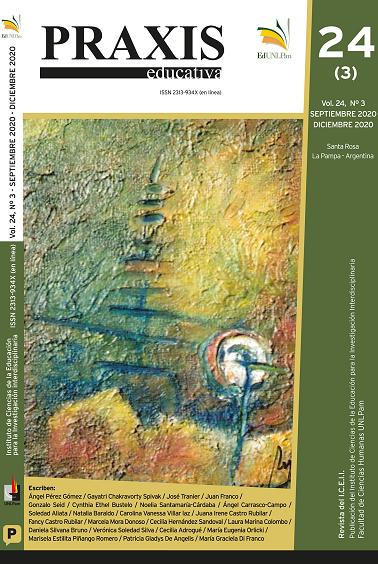Writing groups, social bonds and affectivity at the postgraduate level
DOI:
https://doi.org/10.19137/praxiseducativa-2020-240310Keywords:
doctorate, master’s, writing circles, social relationsAbstract
The objective of this work is to share an academic writing experience at the postgraduate level to bring to light the importance that peer groups and emotions play in the dissertation writing process. We consider that the bonds that are constructed in these groups improve academic writing since they offer emotional and academic support. Taking into account the problem of low graduation rates at the postgraduate level, we believe that a possible explanation is that academic work is mostly associated with an individual activity. We conclude that encouraging initiatives such as the writing groups equals to start thinking and embodying other academic trajectories, where experiences that celebrate and embrace peer work become a key component of new ways of becoming a researcher.
Downloads
References
Colombo, L. (2013). Una experiencia pedagógica con grupos de escritura en el posgrado. Aula Universitaria, 15, 61-68. Recuperado de http://bibliotecavirtual.unl.edu.ar/publicaciones/index.php/AulaUniversitaria/article/view/4368/6643.
Colombo, L., y Carlino, P. (2015). Grupos para el desarrollo de la escritura científico-académica: Una revisión de trabajos anglosajones. Lenguaje, 43(1), 13-34. DOI: 10.25100/lenguaje.v25143i25101.24993.
Elias, N., y Scotson, J. (2016). Establecidos y marginados. Una investigación sociológica sobre problemas comunitarios. México: Fondo de Cultura Económica.
Fernández, A. (1989). El campo grupal. Notas para una genealogía. Buenos Aires: Nueva Visión.
Fernández Fastuca, L. (2018). Pedagogía de la formación doctoral. Ciudad Autónoma de Buenos Aires: Universidad Abierta Interamericana - Teseo.
Fernández Fastuca, L. y Guevara, J. (2017). Los talleres de tesis como aproximación a una comunidad de práctica. Cuadernos de Investigación Educativa, 8(1), 31-46.
Gere, A. (1987). Writing groups: History, theory, and implications. Carbondale & Edwardsville: Southern Illinois University Press.
Gómez Nashiki, A., Jiménez-García, S. A., y Moreles Vázquez, J. (2014). Publicar en revistas científicas, recomendaciones de investigadores de ciencias sociales y humanidades. Revista Mexicana de Investigación Educativa, 19(60), 155-185.
Jodelet, D. (1986). La representación social: fenómenos, conceptos y teoría. En
Moscovici, S. Psicología social II: pensamiento y vida social; psicología social y problemas sociales (pp. 469-494). Barcelona, España: Paidós.
Moscovici, S. (1979) [1961]. La psychanalyse, son image et son public. París, Francia: Presses Universitaires de France.
Moscovici, S. (2001). Social representations. Explorations in Social Psychology. New York: University Press: Washington Square.
Percia, M. (2010). Lo grupal y la cuestión de lo neutro. Biblioteca Teoría y Técnica de Grupos II. Recuperado de http://gou.ps/ubagruposdos
Wagner, W. y Hayes, N. (2011). El discurso de lo cotidiano y el sentido común. La teoría de las representaciones sociales. Barcelona: Anthropos.
Downloads
Published
Issue
Section
License
Copyright Notice
Editorial Committee Educational Praxis Magazine:
I hereby declare that I am the author of the article titled (article name), that it is original and my own and that it was not previously published in any other format or medium. I declare to know that the magazine will not charge me any type of fee under any circumstances, nor will I receive any type of monetary compensation If it were accepted for publication in Educational Praxis, I authorize the aforementioned magazine to publish it digitally and to advertise it on its social networks.
If the work is published, I adhere to the Creative Commons license called "Attribution - Non-Commercial Share Alike CC BY-NC-SA", through which it is allowed to copy, reproduce, distribute, publicly communicate the work and generate derivative works, as long as when the original author is cited and acknowledged. This license has been used since September 2018. In 2016 CC BY NC ND 4.0 was adhered to; and in the years 2017 and 2018 (January-August) CC BY NC 4.0.
This CC BY-NC-SA Share Alike license does not, however, permit commercial use of the work. As an author, the journal may establish additional agreements for the non-exclusive distribution of the version of the work published in the journal, it allows me to self-archive the published articles, in their post-print version, in institutional, thematic repositories, personal web pages or any other relevant use. with the recognition of having been first published in this journal.
Educational Praxis adheres to DORA (Declaration on Research Assessment) signed in San Francisco, California, on December 16, 2012, and to the Declaration of Mexico (Joint Declaration LATINDEX - REDALYC - CLACSO - IBICT).















_(1)2.png)


3.png)











_(2).png)






2.jpg)









